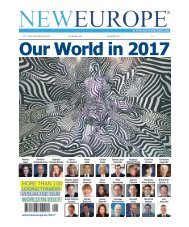Our World in 2018
Leading minds reflect on the state of our societies, and examine the challenges that lie ahead. An edition dedicated to generating ideas that will help form a new vision for our world.
Leading minds reflect on the state of our societies, and examine the challenges that lie ahead. An edition dedicated to generating ideas that will help form a new vision for our world.
You also want an ePaper? Increase the reach of your titles
YUMPU automatically turns print PDFs into web optimized ePapers that Google loves.
EUROPE’S FUTURE
Anti-Brexit
campaign group
‘The No 10
Vigil’ sail a boat
bedecked with
E
River Thames in
London, Britain,
19 August 2017.
EPA/Tolga Akmen
with the policy insiders who they hope will tell them what
is really going on. This triangulation results in advocacy
Cameron ’16 or Merkel ’17).
More dangerously, these trade associations and
their agencies create their own large echo chambers of
mutual denial where they furiously agree with each other
about what should happen rather than analysing, and
attempting to shape, what is actually happening.
Caught up in the arcane procedures of the Brussels
bureaucracy, these insiders dismiss the online petition
campaigns of Europe’s legions of NGOs as so much
‘clicktivism’ while failing to realise the power of a simple
message, repeated ceaselessly, endorsed by tens of
thousands.
The depressing history of European referendums
indicate that ultimately this sort of policy by petition
is a democratic dead end. It is too easily hijacked by
extremists who use it to push their agenda over the
heads of the silent majority. But the traditional lobbying
model is also not tenable.
Can we triangulate our way out of this one?
Perhaps we can. Traditional business lobbies can no
longer just rely on sober appeals to economic clout and
OUR WORLD | 2018
job creation in order to protect their laundry lists of
priorities.
They need to scan the horizon for the issue that would
have the biggest impact on their membership, devote
the resources to properly quantify the risk and frame
the problem, and then relentlessly campaign.
Crucially, they need to attach genuine and tangible
political reward to their side of the argument. Because
the other side are all about attaching political risk.
They need to identify every other interest that would
be affected by the change, find the most compelling
people within that group, and amplify their voices. They
need champions who can push back on inaccuracies
and distortions promoted by opposed interests, and
who will praise political leaders for doing the right thing.
Ultimately, if enough relevant policy-makers hear enough
genuine grievances from enough real people, they will
think twice before making harmful decisions.
Campaigning is exhausting. It takes discipline,
resources and organisation. But it works. It also forces
all of us to focus on what really matters, rather than
.
Ultimately, this is the road to a European politics that is
more substantive, realistic and useful. So, here’s to 2018,
and to the campaigns ahead.
43










